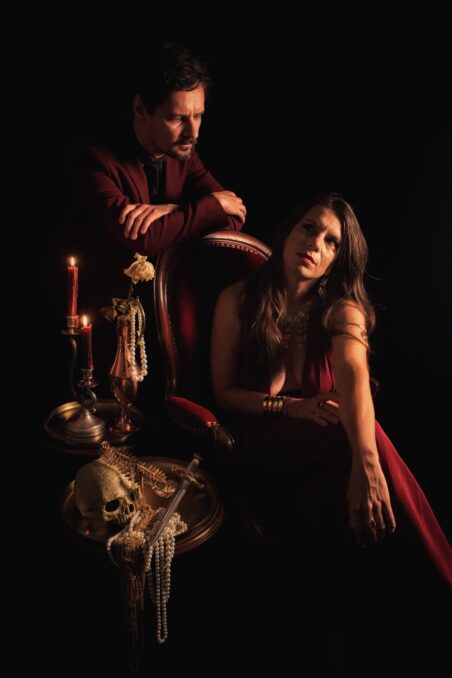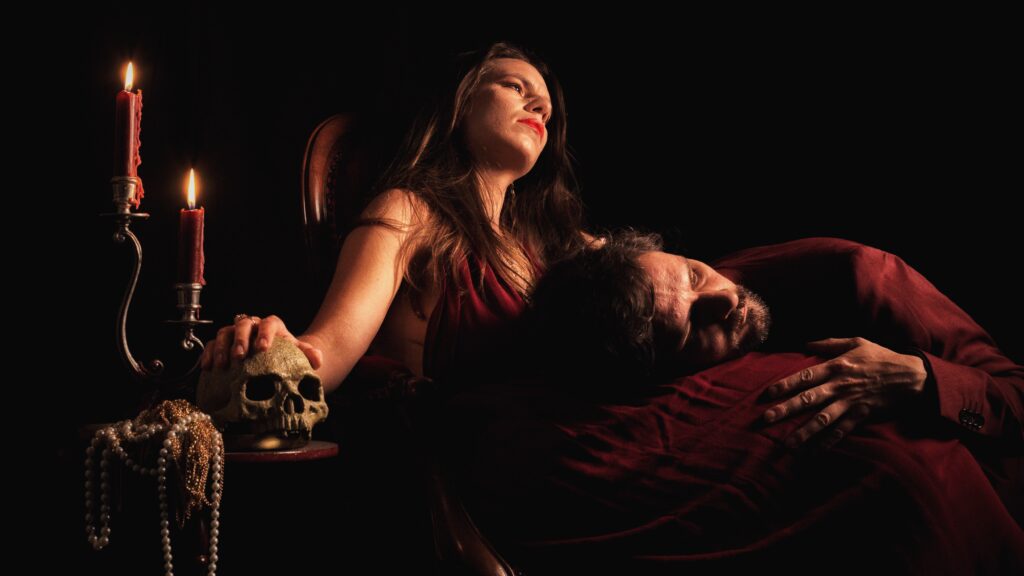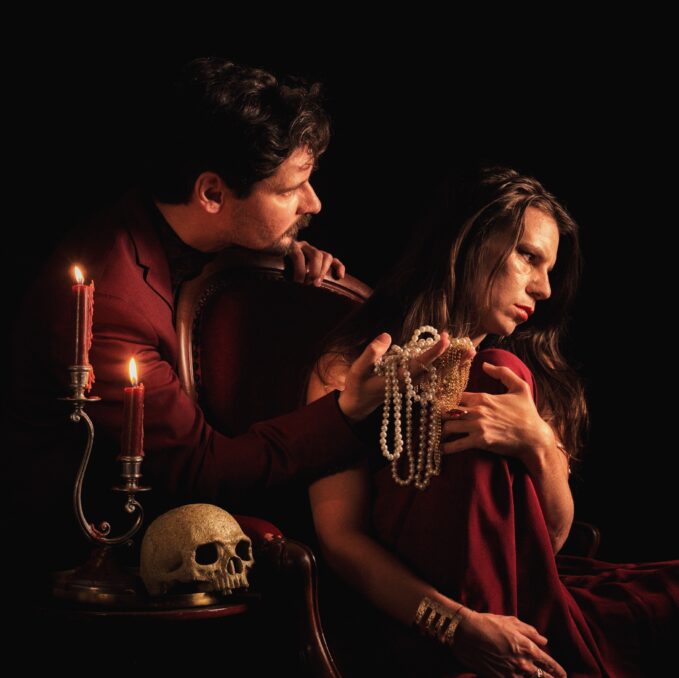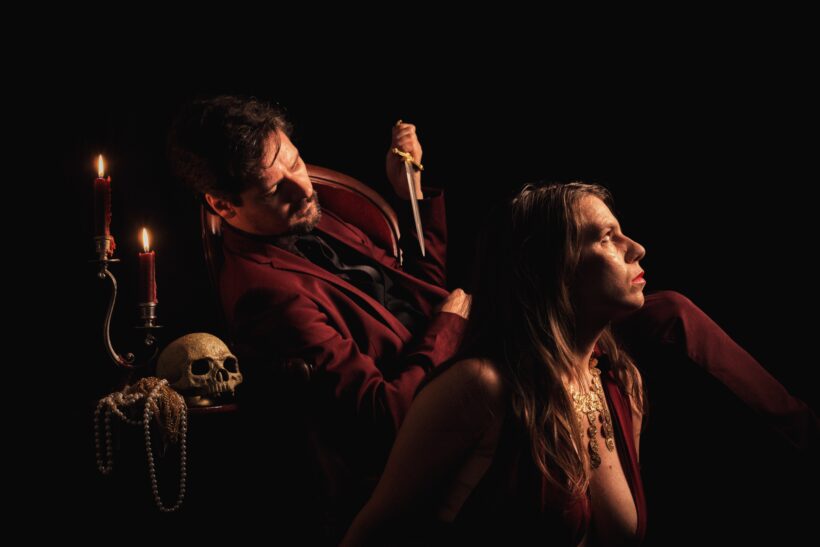Today we welcome Hélène Ruzic and Benjamin Racine of -ii- (pronounced “Two Eyes”), the Dark Noise Rock / Shoegaze Industrial / Goth Post-Rock project returning with their new album Apostles of the Flesh. After the acclaimed Extinction and years shaped by the pandemic and a broadened lineup with DVNE’s Maxime Keller and drummer David l’Huillier, the band opens up about the album’s creation, its cultural influences, the vision behind “The Birth of Venus,” and their plans to bring this new chapter to the stage.

Welcome to -ii- (Two Eyes)
Hi, Hélène and Benjamin. Welcome to Femme Metal Webzine. First of all, I want to thank you. Thank you to be here. And secondly, how are you and how this period is treating you, you know, with the promotion and everything.
Benjamin: Well, yes, it’s really good to have you interviewing us. I mean, we’re really glad to share our music with you. We’re excited. We’re pretty eager for the album to drop because it’s been a long, long, long, long time in the works and it has to go out somehow.
Creating the new album of -ii- (Two Eyes)
Okay, so let’s talk about Apostles of the Flesh. I want to ask you first of all, when you started to collect the first ideas, when did you go into production for this album?
Hélène: It was three years ago. We really started…
Benjamin: I guess it would be 2022. Yeah. Yep. Because COVID hit in 2020. Yeah. Then we released our first album, Extinction, in 2021. And the year after that, yeah, it’s the year after that, we had the idea of incorporating two other musicians. So we invited Maxime and David to play with us. And we started pretty quickly. So I would say summer 2022, we were already kind of jamming and gathering…
Hélène: Yeah, and I was writing some lyrics. Yeah, it was summer 2021.
Apostles of the Flesh is arriving now
Your last album came out in 2021, and now Apostles of the Flesh is arriving in October 2025. I don’t want to call it a “gap,” but there’s definitely a significant stretch of time in which a lot has happened. How did the pandemic ultimately influence this new release? Many people think it’s “over,” yet venues are still dealing with scheduling backlogs from years ago, and much of the music being released today was written during that period. The pandemic continues to have a major impact on artists, creatively and practically.
Benjamin: Yeah, it had an impact because everything was kind of hard to… It was pretty difficult to see what was going to happen. We had no clues about how the future was going to unfurl, we felt like we didn’t now what in the future would happen. It became natural to stay in the studio, to work on the album and go deep as possible into the composition and process, I would say.
Hélène: Yeah, we really didn’t urge, I would say we really did want to take the time to go to the end of the process of the production. So yeah, we really wanted to take the time to do things good, to look good. And so, that’s why, there’s a gap between the two albums but it’s ok. As Benjamin said, we wanted to really take the time to do the whole process, not perfectly, but in a better manner.
Benjamin from -ii- (Two Eyes) producing the new album
Yeah, you know what I wanted also to ask you, you know, Benjamin, you were also the producer on this album. I want to ask you how much challenging it was for you to have at the same time two pair of shoes. Because you compose, you write and at the same time, you produce your music. So to some extent, it can be also difficult to see, you know, the border between the roles to say, well, also “that’s it, it’s enough”.
Benjamin: Yeah, sure. Well, to me, it’s pretty natural because it’s not that I don’t care about what I compose in the band, but I really don’t actually, because I don’t consider my input as a composer as important as my input as a producer. For example, I rembember “The Birth of Venus” was one of the first songs we ever created for the album.
We always thought this song a main piece. At the time, I had just the riff and nothing else. What was it interesting is that I was focused also on the artistic direction in regards how Maxime and David instruments should sound. I was also focused on working more on the interpretation, moods and feelings.
At this point, my instrument (the guitar) became secondary because I found much more important the artistic direction. Actually, we both do it. Me and Hélène tend to agree on everything on that side. And for me, it is most important part. We could play all kind of instruments, I can even learn a new instrument, and Hélène learned a new instrument. However, what matters is the result which is really tight with the production method. So, being the producer for me is not that hard but it is kinda the same, actually.

-ii- (Two Eyes) became a four piece
You know, you mentioned also Maxime and David. And I wanted to ask you, well, this time you recorded the album as a four piece now. What challenge you had to conceive the whole project as a four piece in place of a duo?
Hélène: I didn’t feel a real challenge for me. Now the thing that is very challenging is to gather each other because Maxime has a lot of other bands. David is a curator of the drum museum in Senones, France.
Benjamin: It’s brand new, but yeah. Yeah.
Hélène: I think it is the only museum in the world dedicated to the drums. So, yeah, it was very difficult to gather all together. But despite that, I didn’t feel a real challenge.
Benjamin: Yeah, that’s the thing. It was absolutely no challenge because Maxime and David are really old friends of mine and Hélène‘s and we get along so well. And musically we understand each other so well. There was the pandemic and it was the time where well it was a shit time because of the whole situation.
“It was one of the easiest album to compose for us (in-ii- (Two Eyes))”
But still musically because we were gathered in this special insight, place and time, everything felt natural. Everybody was getting loose and easy. Actually, it was one of the easiest album to compose for us becasue we felt a connection. We were just jamming with friends with almost the same ideas. Of course, sometimes we have argued about how we should continue. In the end, it was no problem whatsoever.
“There are no ego”
Arguing in a way is part of communication. If you sometimes argue in a relationship I think healthy because there are two different point of views. Well, you came up, you come up to a middle point. So it’s also to understand where you are, you know?
Benjamin: Yeah, we agree. And it’s so great to be challenged by Maxim and David because they are two excellent musicians. I trust their inputs. Maybe sometimes I won’t have the same visions as them, but it’s always nice to have their feedback. And it’s always great and insightful. It’s always like, there’s always a good reason for them to advance an idea or something. No one wants to take the lead.
Hélène: There are no ego.
Benjamin: It’s not about ego, it’s about what artistically what do we want to do and well Hélène and I have the keys to this vision but if they have great ideas and who am I to deny them? I mean it’s just I don’t care where they come from, I just want to make a great album and yeah we were just making a good album with some good friends and that was pretty nice.
-ii- (Two Eyes) and the Maloya traditional elements
I dare to say it is the most important thing. You know, I also wanted to ask you, Hélène you grew up a la Réunion. There are some Maloya traditional elements. I’m not really familiar with that. It’s the first time I, that I heard about it. And I tried to do some research, but I was really curious to hear from you what is Maloya music?
Hélène: Yeah, Maloya is a music from the Reunion Island, so where I grew up in the Indian Ocean. It was a type of music created by the slaves, it’s kind of the blues from the Indian Ocean. It’s music mixed with music from East Africa, from India and Madagascar. So yes, there was a music played by the slaves. And at the beginning, there were only percussion. And the major instrument of the Maloja is the kayamb. It is a type of percussion where there are seeds in it and it makes a lot of noise when you shake it, you lead the rhythm.
Benjamin: It’s loud as fuck [laughs].

The use of the kayamb
It’s really interesting how this instrument sounds, and how is it mixed in Apostles of the Flesh because it mistook them for maracas. Then I went reading the press release and I discovered that…
Hélène: Yeah, it sounds like some kind of shaker.
Benjamin: Yeah. It’s a big ass shaker. And it’s really interesting because the Maloya is really percussive. It’s almost tribal. The kayamb has this shuffle groove that’s really, you know, it’s almost cathartic because you need to get into a trance to play it. We wanted to have something, so we had that. And it’s pretty nice.
-ii- (Two Eyes) video for “The Birth of Venus”
I also liked a lot the video for “The Birth of Venus” and I wanted to ask you how the back story and how was to film it. Because I know that you do everything almost in-house…
Hélène: Yeah, we started taking inspiration from the Botticelli’s painting. We approach the shooting and the scenography with a minimalist way, because we don’t have a lot of the logistics avalaible.
Benjamin: We couldn’t afford the giant shell [laughs].
“Sensuality and sexuality have always been part of our music”
Hélène: With this song and this music video, I really wanted to talk about personal subject as the bisexuality. And we wanted to talk about this, but in a way that is not too much explicit. I would not feel sad or angry if somebody didn’t catch it in the music video or if someone understands something else from the music video. We’re fine with that.
Benjamin: Yeah, it’s open to interpretation.
Hélène: Yeah, it’s open to interpretation. So, yeah, that’s how we think about our music.
Setting boundaries
Benjamin: Yeah, we wanted to approach Hélène‘s bisexuality in a way that’s more cryptic than explicit, as she said. It felt like black and white was great because it had this slick look. But also, well, becasue heteronormativity is seen as black or white. We wanted to have something in a shade of gray to incorporate the idea of the bisexuality. Sensuality and sexuality have always been part of our music. And, it something we want to talk about and also evoke. This is how we came up with the idea of the birth of Venus from Botticelli. Venus is like a goddess and she’s naked but she’s kind of hiding herself but also…

Taking inspiration from Botticelli (for the visual -ii- (Two Eyes))
…hide and seek a little bit…
Benjamin: Indeed, it’s hide and seek. There’s also Zephyr which on Botticelli’s painting is portrayed on the left. He’s the god of wind and he wants to get her even more naked. Then, on the right side, you have another character who wants to cover her with a drape. Given all this, we took in all these element by using the white sheets and the use of fans to get some wind. At the end, we tried to get a symbolistic approach. Yeah.
Hélène: And we saw it as not necessarily the birth of Venus, but the birth of femininity, the birth of new femininity.
Portraying the female body with respect
Well, I found it a really nice video. At first, I never got the real meaning. So you explain it to me right now. And I find it really artsy, but I find it really not vulgar, you know, it’s elegant and it expresses just pure femininity for me.
And, it’s also a compliment. Because in the video clip, they tend to portray a woman really naked. For me, it’s the other way around. It doesn’t need to be constantly shown everything to portray something. It’s not that I am a puritan but that it’s just that I find sometimes that it is too much, and sometimes it will be better to less.
[continue]
Hélène: Yeah, we totally agree. I think we totally agree.
Benjamin: And since I’m a male, it’s also hard to, how do I not succumb to the male gaze when filming these kind of videos? So we always have a back and forth with Hélène to try to think about. So how do we do this? How are you comfortable with this? How much do you want to show or how more? Like you said, it’s a fine line that we have find.
Hélène: Because, yeah, as you said, how much I want to push further. And if I show this part of my body, will I have some backlash or something? So, yes, sometimes it’s very tricky, but now I have the right measure. In a way, we want also to raise awareness on this topic. And I thank you for the compliments and you share our vision.
Tour plans for -ii- (Two Eyes)
So, Helen and Benjamin, I wanted to ask you if do you any tour plans for Apostles of the Flesh?
Hélène: We had our release party in Nancy on the 23rd October together with Bruit and Alcest. Then, we played in Switzerland and Barberage (near Chambéry) as a duo. Then, we had a gig in the French Alps and in Nice. Though, it’s really difficult to book shows because of the economic and political context, and because a lot of venues are closing. Additionally, we are doing everything ourselves without the help of a booking agency. And we hope to play some festival next year in support of Apostles of the Flesh.
Closing words
I just really hope for the best. Saying this,I would like to thank you for your time. I hope you did enjoy it. And I hope I asked you everything.
Hélène: Thank you so much.
Benjamin: Thank you so much.
